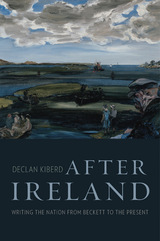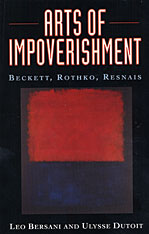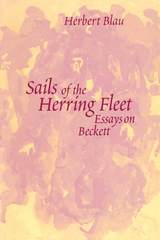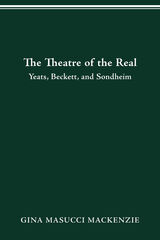
Ireland is suffering from a crisis of authority. Catholic Church scandals, political corruption, and economic collapse have shaken the Irish people’s faith in their institutions and thrown the nation’s struggle for independence into question. While Declan Kiberd explores how political failures and economic globalization have eroded Irish sovereignty, he also sees a way out of this crisis. After Ireland surveys thirty works by modern writers that speak to worrisome trends in Irish life and yet also imagine a renewed, more plural and open nation.
After Dublin burned in 1916, Samuel Beckett feared “the birth of a nation might also seal its doom.” In Waiting for Godot and a range of powerful works by other writers, Kiberd traces the development of an early warning system in Irish literature that portended social, cultural, and political decline. Edna O’Brien, Frank O’Connor, Seamus Heaney, and Michael Hartnett lamented the loss of the Irish language, Gaelic tradition, and rural life. Nuala Ní Dhomhnaill and Eavan Boland grappled with institutional corruption and the end of traditional Catholicism. These themes, though bleak, led to audacious experimentation, exemplified in the plays of Brian Friel and Tom Murphy and the novels of John Banville. Their achievements embody the defiance and resourcefulness of Ireland’s founding spirit—and a strange kind of hope.
After Ireland places these writers and others at the center of Ireland’s ongoing fight for independence. In their diagnoses of Ireland’s troubles, Irish artists preserve and extend a humane culture, planting the seeds of a sound moral economy.

“How almost true they sometimes almost ring!” Samuel Beckett’s character rues his words. “How wanting in inanity!” A person could almost understand them! Why taunt and flout us, as Beckett’s writing does? Why discourage us from seeing, as Mark Rothko’s paintings often can? Why immobilize and daze us, as Alain Resnais’s films sometimes will? Why, Leo Bersani and Ulysse Dutoit ask, would three acknowledged masters of their media make work deliberately opaque and inhospitable to an audience? This book shows us how such crippling moves may signal a profoundly original—and profoundly anti-modernist—renunciation of art’s authority.
Our culture, while paying little attention to art, puts great faith in its edifying and enlightening value. Yet Beckett’s threadbare plays Company and Worstward Ho, so insistent on their poverty of meaning; Rothko’s nearly monochromatic paintings in the Houston Chapel; Resnais’s intensely self-contained, self-referential films Night and Fog and Muriel all seem to say, “I have little to show you, little to tell you, nothing to teach you.” Bersani and Dutoit consider these works as acts of resistance; by inhibiting our movement toward them, they purposely frustrate our faith in art as a way of appropriating and ultimately mastering reality.
As this book demonstrates, these artists train us in new modes of mobility, which differ from the moves of an appropriating consciousness. As a form of cultural resistance, a rejection of a view of reality—both objects and human subjects—as simply there for the taking, this training may even give birth to a new kind of political power, one paradoxically consistent with the renunciation of authority. In its movement among these three artists, Arts of Impoverishment traces a new form of movement within art.


In Sight Unseen radio drama, a genre traditionally dismissed as popular culture, is celebrated as high art. The radio plays discussed here range from the conventional (John Arden’s Pearl) to the docudramatic (David Rudkin’s Cries from Casement), from the curtly conversational (Harold Pinter’s A Slight Ache) to the virtually operatic (Robert Ferguson’s Transfigured Night), testifying to radio drama’s variety and literary stature. Two of the plays included in this study pose aesthetic questions—the role of art in politics (Howard Barker’s Scenes from an Execution), and the nature of artistic excellence (Tom Stoppard’s Artist Descending a Staircase).
Guralnick contends that well-crafted radio plays tend to meld to their medium so naturally that they cannot be transferred to the theater or to film without being diminished. Each play is thus shown to exploit, to special effect, one of radio’s fundamental features: its invisible stage (Barker and Stoppard), its affinity to music (Ferguson and Beckett), its ability to imitate the mind’s subjectivity (Kopit and Pinter), its association with world events through features and the news (Rudkin). As for the question of radio’s relation to the theater, the issue is engaged in the work of John Arden, who dares to portray a theatrical stage on the airwaves, while intimating that the radio offers contemporary playwrights an incomparable boon: creative conditions roughly equivalent to those enjoyed by Shakespeare.

READERS
Browse our collection.
PUBLISHERS
See BiblioVault's publisher services.
STUDENT SERVICES
Files for college accessibility offices.
UChicago Accessibility Resources
home | accessibility | search | about | contact us
BiblioVault ® 2001 - 2024
The University of Chicago Press









